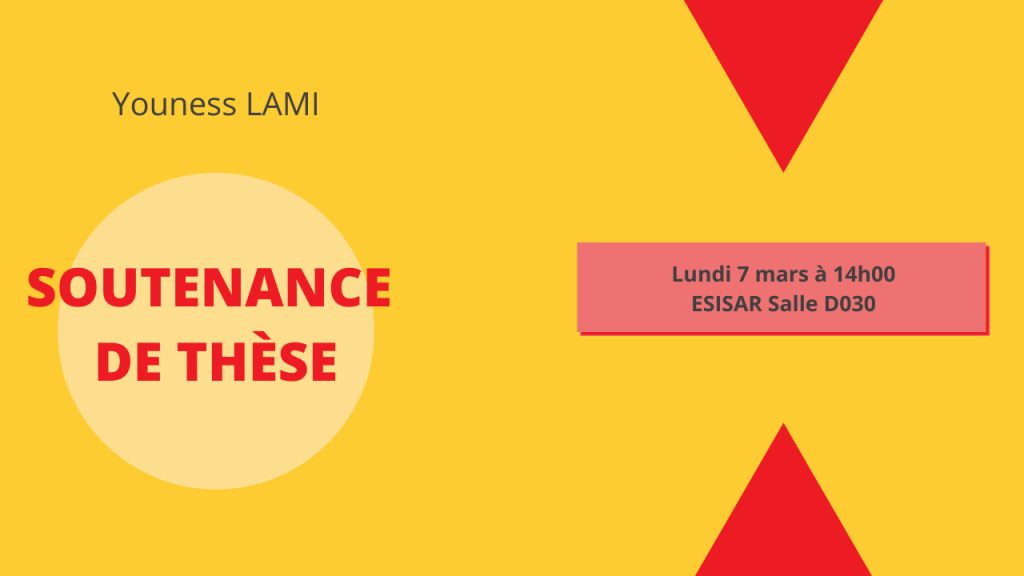
- Cet évènement est passé
Soutenance de thèse de M Youness LAMI

7 mars, 2022 à 2:00 pm – 3:00 pm CET
Laurent LEFEVRE, Denis GENON-CATALOT et André LAGREZE et ont le plaisir de vous convier à la soutenance de thèse de Youness LAMI
“A Distributed Approach for Fault Diagnosis in Open Complex Systems”La soutenance aura lieu :
le lundi 7 mars 2022 à 14h00
ESISAR Salle D030
Abstract: Nowadays, modern technological systems are more and more based on sophisticated control architectures, which guarantee performance and operational reliability. Moreover, with the rise of wireless networks over the past decades, instrumenting such open systems (with variable topology), using a sensors/actuators network for control and supervision purposes, has become very common. One of the significant issues associated with this type of system is the ubiquitous existence of sensor and actuators faults (breakdowns, loss of communication, biases, etc.). The development of diagnosis techniques is crucial for specific systems where, often, a “minor” fault can have severe or even catastrophic impacts on the system’s evolution.
This thesis presents the fault diagnosis of water systems, more precisely water canals, and the suitability of a distributed diagnosis approach. Detailed discussions with theoretical and simulation results are provided.
In order to conduct simulations of the hydraulic network that is composed of free-surface canals and water structures, a mathematical model, which computational burden is relatively low and has the benefit of modular computing, is established. A discrete-time nonlinear model for the canal is obtained by coupling the Saint-Venant equations, which describe the physics of free-surface fluids, and the Lattice Boltzmann method used for fluid simulation. Physical instrumentation (water level sensors, motors, radio modules for wireless communication) of an existing facility, micro-canal, has also been conducted.
For fault diagnosis, fault classification and a system division to make the approach modular are suggested. A contribution to fault diagnosis along water canals by considering gates, sensors and outflow faults is made. Theoretical and simulation results are presented for two scenarios. A first scenario where single fault occurrences of each type are tackled and a second one where simultaneous faults of different types in the same canal reach/pool are studied.
A Bayesian probabilistic model is suggested for fault diagnosis of control systems. The suitability of such a model for probability calculus that allows the presence of unobserved states or variables is presented. Theoretical and simulation results are presented with regard to prior probabilities effects and time dependencies. This Bayesian model aims at providing a unifying framework that can be integrated with any fault diagnosis method.
The suitability of a distributed multi-agent architecture where agents are assigned to execute a subsystem fault diagnosis is presented. The relevance of such a modular approach when it is applied it to larger-scale canal networks is highlighted. Theoretical and simulation results for agents diagnosis performance are presented for a sequence of each fault type along a canal pool. The suitability of using a Bayesian diagnosis combined with the multi-agent paradigm is introduced and discussed.
Keywords: Fault Detection and Diagnosis, Irrigation networks, Saint-Venant equations, Lattice Boltzmann, Networked Control System, Bayesian diagnosis, Multi-Agent System, Distributed approaches
The deliberative jury members will be:
Prof. Vincent CHEVRIER, from LORIA and Université de Lorraine (ENSEM)
Prof. Eric DUVIELLA, from Institut Mines Télécom (IMT Nord Europe)
Prof. Vicenç PUIG, from Universitat Politècnica de Catalunya (UPC Barcelona)
Prof. Jean-Marc THIRIET from Gipsa-lab and Université Grenoble Alpes


